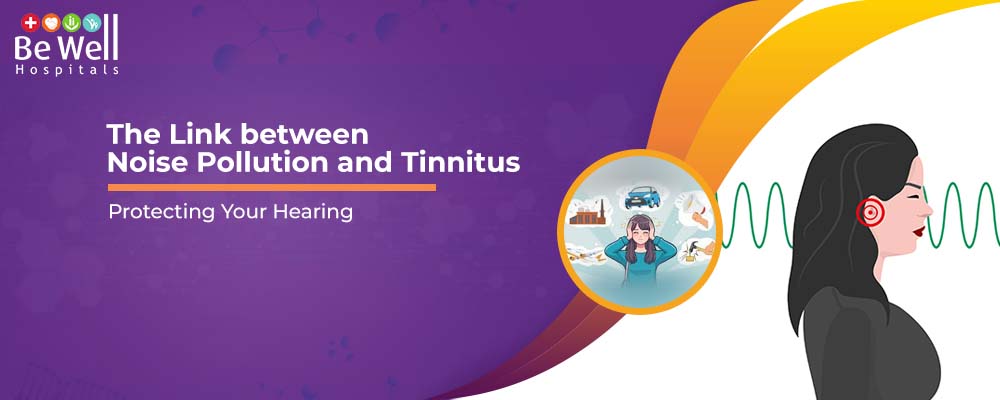The Link between Noise Pollution and Tinnitus: Protecting Your Hearing

Introduction
Noise pollution has become an increasingly significant environmental health concern, affecting millions of individuals worldwide. One of its lesser-known yet highly impactful consequences is tinnitus, a condition characterized by persistent ringing or buzzing in the ears. Tinnitus can severely affect a person’s quality of life, leading to difficulties in concentration, sleep, and emotional well-being. This blog delves into the connection between noise pollution and tinnitus, shedding light on how prolonged exposure to excessive noise damages hearing health. Additionally, we will provide actionable tips to help protect your hearing and minimize the risks associated with noise-induced tinnitus. Let’s explore how we can safeguard our ears in a world that’s growing louder every day.
What is Noise Pollution?
Noise pollution is defined as harmful or disruptive sound that interferes with normal activities, leading to potential health risks. Common sources of noise pollution include traffic, industrial activities, construction sites, loud music, and aircraft noise. Prolonged exposure to high-decibel sounds can cause significant damage to the auditory system, leading to permanent hearing loss or conditions like tinnitus. In addition to hearing problems, noise pollution can also contribute to stress, sleep disturbances, and increased risk of cardiovascular diseases. Globally, it is estimated that over 1 billion people are at risk of hearing loss due to excessive noise exposure. In urban areas, the World Health Organization reports that noise pollution is responsible for about 50,000 deaths annually, mainly due to cardiovascular diseases. As the world becomes more industrialized and urbanized, the risks associated with noise pollution and hearing-related issues continue to rise, making it crucial to address this growing environmental concern.
Understanding Tinnitus
Tinnitus is the perception of ringing, buzzing, or other sounds in the ears or head, despite the absence of an external sound source. It is a condition that affects millions of people worldwide, and it can occur in one or both ears. There are two main types of tinnitus:
The symptoms of tinnitus can vary greatly among individuals, but some of the most common include:
Beyond the physical symptoms, tinnitus can have significant emotional and psychological effects, including anxiety, depression, irritability, and insomnia. For many, the constant noise can interfere with concentration, sleep, and the ability to carry out normal activities, ultimately affecting quality of life. The frustration and distress of living with tinnitus can make daily life difficult, especially when the condition is severe or persistent.
The Connection Between Noise Pollution and Tinnitus
Noise pollution has a direct impact on hearing health, particularly through its damage to the delicate structures of the inner ear, such as the hair cells. These tiny cells are responsible for transmitting sound signals to the brain, and when they are damaged due to prolonged exposure to high-decibel noise, it can lead to conditions like tinnitus. Scientific research has established a strong connection between chronic noise exposure and the development of tinnitus, showing that environments with consistent loud noises (such as traffic, construction, or loud music) significantly increase the risk of both tinnitus and hearing loss over time. Studies have shown that individuals who work in noisy environments or regularly expose themselves to loud music are at a higher risk of developing tinnitus. For example, case studies of workers in industries like construction or manufacturing, as well as musicians or concertgoers, illustrate the long-term effects of noise pollution on hearing. These real-world examples highlight the need for protective measures, such as wearing ear protection, to prevent damage and preserve hearing health.
Risk Factors for Tinnitus Caused by Noise Pollution
Tinnitus caused by noise pollution is influenced by several risk factors that can increase the likelihood of developing this condition. These include:
Understanding these risk factors is crucial in preventing tinnitus and protecting hearing health.
How to Protect Your Hearing from Noise Pollution
Protecting your hearing from noise pollution is essential to prevent long-term damage and conditions like tinnitus. Here are some key tips to reduce noise exposure:
Additionally, regular hearing check-ups are crucial to catch early signs of damage and protect your auditory health. Advocacy for stricter noise pollution regulations and raising public awareness about noise-related health risks are also vital steps toward safeguarding hearing for everyone.
Managing and Preventing Tinnitus
Managing and preventing tinnitus involves a combination of treatment options and preventive strategies to help reduce symptoms and protect hearing. Here are some key approaches:
In addition to these treatments, preventive strategies are essential to protect ear health, including maintaining low noise levels, using protective equipment in noisy environments, and adopting healthy lifestyle habits that support ear health and overall well-being.
Conclusion
Noise pollution poses significant risks to hearing health, with prolonged exposure leading to conditions such as tinnitus and hearing loss. The harmful effects of loud environments can damage the delicate structures of the inner ear, causing long-term consequences that affect quality of life. It is essential to take proactive measures to protect hearing, such as using ear protection in noisy settings, managing exposure to loud sounds, and seeking regular check-ups. By prioritizing these precautions, individuals can reduce their risk of tinnitus and preserve their hearing.
For expert advice and comprehensive care, visit our ENT Department at Be Well Hospitals or call 9698 300 300 to book an appointment today.
